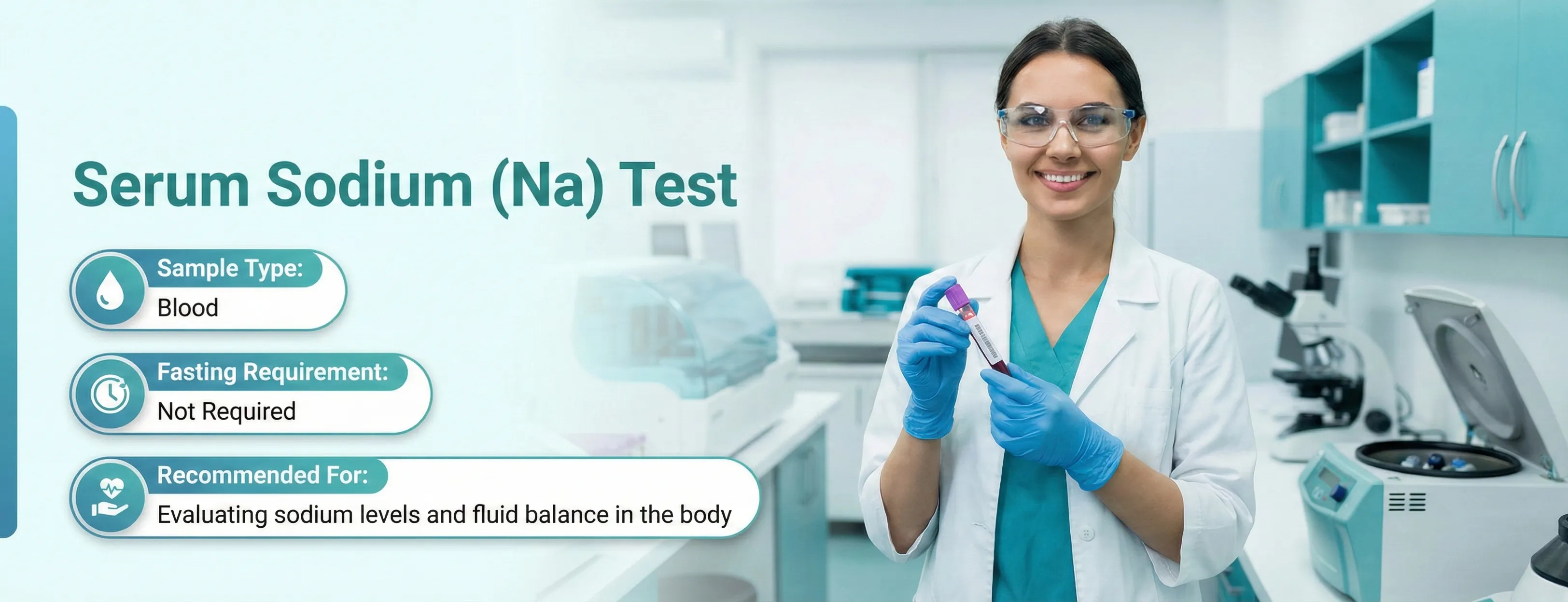1067+ orders placed in your location
100% NABL & ISO Certified Lab • 100% Accurate Reports
Serum Sodium (Na) Test
Sodium Test, Serum Sodium Test, Na+ Test
- SummaryThe Serum Sodium test measures the amount of sodium in the blood, which is vital for maintaining fluid balance, nerve function, and muscle activity. It helps diagnose conditions like dehydration, kidney disease, or hormonal imbalances. The test is performed using a blood sample, and fasting is not required.Read more
- Reports Within14 HrsView Sample Report100% NABL & ISO Certified Labs
- SampleBlood
- AgeAll Age Group
- GenderMale and Female
- FastingNot Required
PharmEasy Promises
Know More About The Test
A quick info on Serum Sodium (Na) Test
Overview
The Sodium Serum test is conducted to determine the current level of sodium in the body.
Sodium is an important element in the human body and is responsible for maintaining the body in a healthy state. With abnormal levels of sodium, the body can often develop a number of health disorders like hypertension.
The Sodium Serum test is usually conducted as a part of a group of tests to measure the levels of different substances in the blood. These tests are together called Basic Metabolic Panel (BMP) and Electrolyte Panel test. These tests evaluate the acid-to-base balance, the level of electrolytes and the glucose level in blood.
Sodium helps in maintaining the body's cardiovascular and nervous systems. So, it is very important for the body to have just the appropriate amount of sodium in the blood because any abnormality can have serious effects.
Doctors prescribe the Sodium Serum test as a part of your routine health checkup or when you have a condition that can adversely affect the level of sodium in your body. (For instance, when you are taking medication, etc.)
There have been many studies noting that Indians consume way more sodium than what is recommended as the daily sodium intake by the World Health Organization. The Indian diet is rich in salt and so, the country’s population is largely found overconsuming sodium.
Over a prolonged period, if excess sodium levels go untreated, the body can develop a number of issues, like the disrupted functioning of the nervous system and hypertension.
Risk Assessment
Hypernatremia, Hyponatremia, People undergoing surgery
What does this Test Detect?
The Sodium Serum test is suggested for:
- People who have gone through serious physical injury or surgery and have consumed a lot of medications. In such a situation, excessive medicines can disrupt the sodium-to-water balance in the body.
- People who take intravenous fluids. This can be for many reasons and not just an injury requiring hospital admission. Many people have preexisting health conditions that require a drip (IV). To make sure that the body’s sodium level is not adversely affected by injecting fluids into the veins, the doctor may suggest testing for sodium.
- People who regularly intake large amounts of salt have developed Hypernatremia.
Indications for Serum Sodium (Na) Test
Further, people who show any of the following symptoms of abnormal sodium levels in the body (maybe too much or too low sodium) are also advised to get the Sodium Serum test done:
- A rise in blood pressure
- Nausea
- Dizziness
- Exhaustion
- Vomiting
- Pain in muscles
- Having a hormone imbalance and taking medications for it
- Swellings in various parts of the body
- Frequent thirstiness
- Insomnia
- Confusion
These symptoms can prompt your healthcare professional to suggest a Sodium Serum test for the diagnosis of any serious health issues like hypertension, abnormal blood pressure, etc.
How Frequently should you take this Test?
The sodium test is usually a part of your routine health checkup. It is best to consult your doctor to know when you should get your general health checkup done.
In cases of injury where the person has to take extra medication and injection of fluids, the doctor may suggest they get the Sodium Serum test frequently to keep regular tabs on the blood sodium level.
Test Preparation
Before the Test
Prior to Sodium Serum blood and urine test, it is permissible to consume your normal meals. Nonetheless, if this test is being conducted with another, there may be specific dietary restrictions. Hence, to achieve the best outcome, always consult a physician before the procedure.
During the Test
A phlebotomist will collect both a blood sample from your arm and a urine sample. Let's know what to expect from these tests.
- The area where the needle will be inserted will be cleaned with an antiseptic solution.
- A tourniquet band will be wrapped around your arm to enhance the visibility of the veins.
- A needle will be used to draw the blood from the vein. This process may cause a brief pinch that lasts a few seconds.
- The blood will be collected in a vial or small test tube labelled with your details.
After the Test
Once the blood has been collected:
- A bandage will be applied to the puncture site to stop any bleeding.
- Minor bruising is normal, but feeling dizzy is uncommon. You may be asked to sit for a few minutes.
- Contact your healthcare provider if you experience bleeding, pain, or rashes at the puncture site.
Parameters
The two kinds of blood tests that determine the sodium levels in the blood have different testing parameters:
Electrolyte Panel Test
Electrolytes are important minerals found in the body, responsible for maintaining a healthy water balance in the body and ensuring that the body’s pH level is maintained.
The Electrolyte Panel test includes testing for Sodium, Potassium, Chloride and Bicarbonate. All these electrolytes have an instrumental role in ensuring that the body is functioning at its best.
Basic Metabolic Panel Test
The Basic Metabolic Panel test measures eight factors, including Sodium, Glucose, Calcium, Chloride, Potassium, Creatinine, Bicarbonate and Blood Urea Nitrogen.
Doctors prescribe this test for the purpose of screening for any health problem, diagnosis of health issues on the basis of symptoms and monitoring any existing health problems.
The Sodium Serum urine test is taken in either of two ways: a normal one-time sample or a 24-hours sample. The 24-hour test will require you to collect a sample every time you urinate in a period of 24 hours. This test will help in recording results in accordance with the dietary sodium intake and is more accurate than the normal urine test.
Ranges
Sodium Serum blood test results should be interpreted on the basis of the following levels:
Range | Interpretation |
Below 135 mmol/L | Lower than normal sodium level |
135-145 mmol/L | Normal sodium level |
Above 145 mmol/L | Higher than normal sodium level |
For the Sodium Serum Urine Test, in the case of a one-time urine sample, the normal sodium value in the urine should be around 20 mmol/L.
For the 24-hour sodium serum urine test, the normal range is 40 to 220 mmol/L per day.
The normal values and reference ranges of the test may vary from lab to lab. Please refer to the ranges mentioned in the report and consult a doctor to understand the interpretation of lab reports.
Test Result Interpretation
When the sodium levels are lower than normal, the person may be suffering from a condition called Hyponatremia. This condition is associated with:
- The adrenal glands do not produce sufficient hormones (termed Addison Disease).
- Conditions of dehydration, vomiting and diarrhoea.
- A build-up of waste products from a fat breakdown in the urine.
- An increase in the total body water is mainly seen in people with heart failure, kidney diseases or some liver disorders.
- Use of medicines such as diuretics (water pills), morphine and SSRI antidepressants.
When the sodium levels are higher than normal, the person may be suffering from a condition called Hypernatremia. This is associated with:
- Issues with the adrenal gland like Cushing’s syndrome or hyperaldosteronism.
- People have the type of diabetes in which kidneys are not able to conserve water or Diabetes Insipidus.
- An increased fluid loss due to excessive sweating, burns, diarrhoea or the use of diuretics.
- Individuals consuming too much salt or sodium bicarbonate in their diet.
- Persons using specific medicines like birth control pills, lithium, laxatives, corticosteroids and NSAIDs like Ibuprofen.
Risk and Limitations
The Sodium Serum test, a frequently conducted blood and urine test, has minimal risks of complications. Seek advice from your doctor if you notice:
- Continuous bleeding from the site where the blood was drawn.
- Inflammation, swelling, or discomfort at the site.
Limitations of the test
- Errors due to faulty equipment or mistakes made by the phlebotomist.
- The possibility of misreading certain indicators, resulting in an incorrect diagnosis and report.
Was This Test Information Helpful?
Please rate your experience
References
Health packages containing 'Serum Sodium (Na) Test'
People Also Ask
What happens when your body is low on sodium?
What happens if sodium is high?
What causes sodium levels to be high?
What causes sodium deficiency?
Does coffee affect sodium levels?
Popular Tests
Have any doubts? Ask us.
Ask us anything about the Serum Sodium (Na) Test to understand it better
We provide trusted, expert-curated health content to support better awareness,prevention, and care.
Backed by experienced doctors, medical experts, and strict editorial standards.


